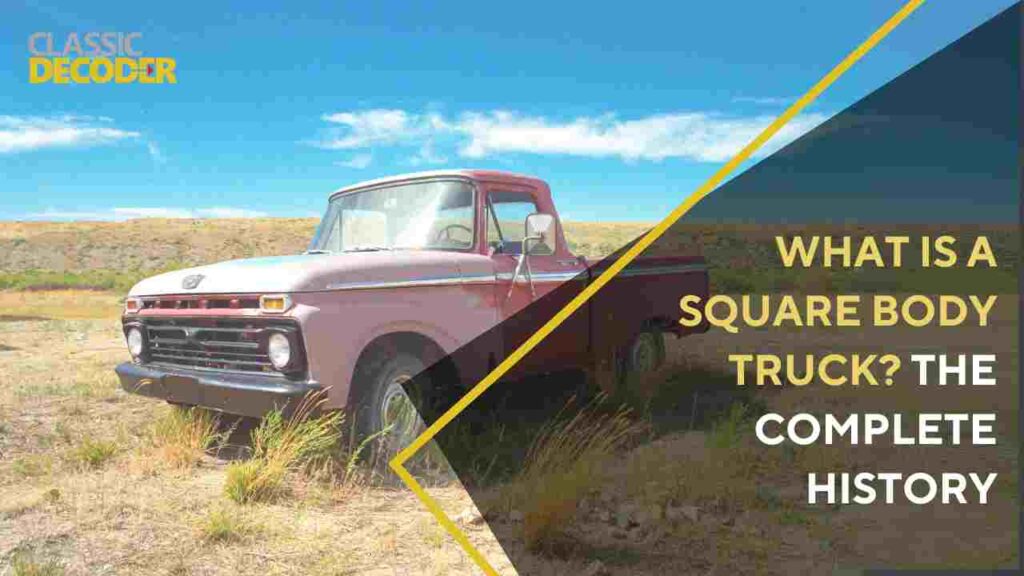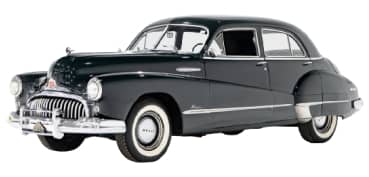Square body trucks are the third generation of Chevrolet and GMC C/K pickups. They debuted in 1973 and continued until 1987. Initially called the “Round-Line” in 1973, these trucks quickly earned the nickname “square body” due to their distinctive box-like shape. Compared to earlier models, square-body trucks made significant design, functionality, and comfort strides.
The History of the Square Body Trucks
The term “square body” refers to the angular design of these trucks. Unlike their predecessors, which featured more rounded shapes, square-body trucks showcased straight lines and a bold, sturdy frame.
The design offered more interior space and a sturdier frame. Many truck enthusiasts appreciate this design for its durability and classic look, making it a beloved option for collectors.
Let’s look at how these classic trucks have grown over the years.
1973 – Introduction and Reception
When square-body trucks first hit the market, they made a strong impression. Buyers appreciated their modern look and practical features. They quickly became popular among contractors and everyday users for both work and leisure. With the way people loved this vehicle, the stage was definitely set for years of sales success.
1975 – New Features and Trim Levels
By 1975, Chevrolet had sold over 75,000 square body trucks, making it their best-selling product that year. But they didn’t end there. They wanted to cater to a wider audience and this led to the introduction of new trim levels. These gave customers more options, and buyers could customize their trucks according to their needs and preferences.
Note however, if you would like to purchase a classic square-body truck now, it’s important to verify just how authentic and reliable it is. This you can do with classic VIN decoders for 5 to 13-digit VINs.
1977 – 1979 – New Sales Records and Bigger Engines
By 1978, square body trucks set another record, with over 1.3 million units sold. This remarkable achievement showcased their growing popularity in the market. The year also introduced the 5.7L V8 diesel engine, which further enhanced the performance of these trucks and buyers really appreciated it.
This combination made the square body trucks not only practical for everyday use but also suitable for more demanding tasks, like towing and hauling.
READ ALSO: Are Classic Cars Good Investments? Everything You Need to Know
1980 Onwards – Bigger Engines, New Designs, New Names
In the early 1980s, Square Body trucks underwent significant changes and essentially became better. They shed nearly 300 pounds through weight reduction efforts while receiving a redesigned front end and updated sheet metal. Modifications included new fenders, hood hinges, and vent windows for improved aerodynamics.
The introduction of the 4.3L Vortec V6 engine in 1985 provided an even more powerful base engine for Chevy trucks. This engine offered better fuel efficiency without sacrificing power which was appreciated during the era when gas prices were rising.
In 1987, GM transitioned to a new naming system using numbers like 10, 20, and 30 for their series—1500, 2500, and 3500 models emerged from this change. Despite these updates, the C1500 remains one of the most popular models today – under the name of Silverado.
This change in naming conventions reflected GM’s desire to simplify its lineup while still catering to various customer needs. The Silverado nameplate has since become synonymous with durability and performance in the truck market.
READ ALSO: 20 of the Best Vintage Trucks for Collectors and Enthusiasts
Restoring Your Square Body Truck
If you’re considering investing in a Square Body truck, you’re making a smart choice! These vehicles offer functionality, availability, and affordability compared to other classic cars. Many examples still thrive on roads today because of their sturdy construction.
One popular trend among enthusiasts is modernizing classic cars while keeping their vintage appeal. You can explore options for upgrading your Square Body’s performance or adding modern conveniences without losing its classic character by checking out resources on how to modernize classic cars.
To help with your restoration journey, understanding your truck’s history is essential. You can decode your Square Body Chevy’s VIN to view specifications and historical details that will guide your project effectively. Check out this resource on how to decode your VIN here.
Frequently Asked Questions
What years did Chevy make square body trucks?
Chevy produced Square Body Trucks from 1973 to 1987. This third generation of Chevrolet and GMC C/K pickups marked a significant evolution in truck design and functionality during that period.
What is a square body Chevy truck?
A Square Body Chevy truck refers to the third generation of Chevrolet and GMC C/K pickups, characterized by their boxy, angular shape. Initially called “Round-Line,” these trucks became known as “Square Body” due to their iconic design. They combined ruggedness with comfort, making them suitable for both work and everyday driving.
What is the most sought after square body Chevy?
The Chevy C10 is often considered the most sought-after Square Body model. Its combination of style, versatility, and performance has made it a favorite among collectors and enthusiasts looking for classic trucks.
When did Chevy stop making the K10?
Chevy ceased production of the K10 model in 1987 when they transitioned to the fourth generation of trucks, riding on the new GMT400 platform. The K10 was part of the popular Square Body lineup, which included various models.
How much are square body trucks worth?
The value of Square Body trucks can vary widely based on factors like condition, mileage, and modifications. Generally, prices can range from $5,000 to over $30,000 for well-restored or rare models. Enthusiasts often seek these trucks for restoration projects, which can further influence their market value.

